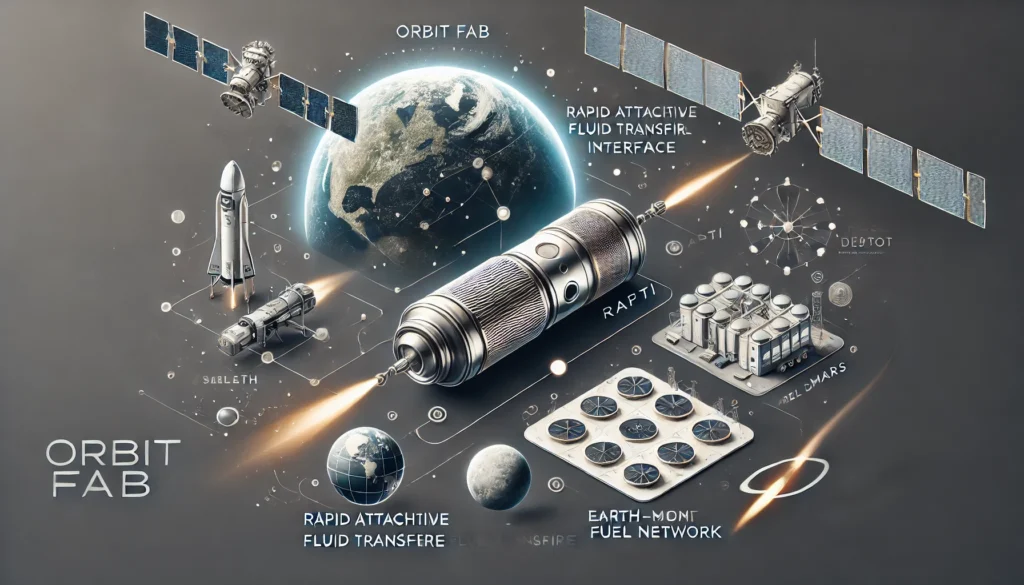For most of the startups, coming up with ideas, that are out of the world, is not out of this world. The space industry around the world has been characterized by the hegemony of certain players and governance by government institutions only, however, there is a shift to a culture of innovative start-ups, today. Among these pioneers, Orbit Fab stands out as a trailblazer with a bold mission: to make a viable market in the space economy by use of on-orbit refueling. More famously known as the “Gas Station in Space”, the company is striving to build a set of service stations for operational satellites that will provide them with additional fuel to increase their service time, make space exploration cheaper, and minimize space debris. What has been established here is a revolutionary concept that if actualized is capable of tilting the balance in the operation of satellites and opening up new horizons for the space business.
Orbit Fab is a fairly young company that has grown rapidly in the aerospace market since its start in 2018 and aims at the solution of one of the major issues in space – the exhaustion of fuel. While a traditional approach considers a satellite as a one-time use, throwaway asset once its fuel is depleted, Orbit Fab sees refueling in space as normal as on the ground. Making heavy use of autonomous technologies, the firm is seeking to revolutionize the economics of its space ventures and positively impact the state of space debris in orbit as well.
About the Founders
Orbit Fab was established by two young enterprisers Daniel Faber and Jeremy Schiel with the drive for space advancement and the principle of sustainability in mind. The Chief Executive Officer, Daniel Faber possesses vast experience in the aerospace business. Who is Faber? With a mechanical engineering background and leading various space initiatives, He has directed Orbit Fab’s technology and growth trajectories. Before co-founding Orbit Fab, he was the CEO of Deep Space Industries specializing in mining and space resources.
When Faber was with Deep Space Industries, he realized that the management of space resources could be quite a complex process, which was a key factor that informed the creation of Orbit Fab. He has been rewarded with such vision in the area of space commercialization and has delivered key speeches at various international conferences about the necessity of the formation of in-space infrastructure.
Jeremy Schiel is assigned the role of the Chief Development Officer (CDO), which integrates into Faber’s strong technical background the company’s Business wisdom. Schiel has a very good insight into the space market over and above developing partnerships, funding, and alliance building. He has also brought an understanding of the intricacies of the aerospace environment, which has boosted Orbit Fab’s growth.

The main area of Schiel’s businessman’s interest was initially an emphasis on innovative technologies. Before joining Orbit Fab, he was involved in several companies in the aerospace and technology industries to develop product and market knowledge. His passion for being engaged on the ground and his ability to predict opportunities that would come up in the market have kept Orbit Fab competitive.
It is also important to mention that both founders have experience working on new space projects and both of them are thinking in the long term, focusing on opening up space for wider use and making the use of space more sustainable. They think that the future of space-based businesses is all about building a reliable infrastructure and, apart from crew supplies, fuel depots are seen as a must-have for such a future. With strong leadership and backed by a team of experienced engineers and business strategists, today Orbit Fab stands as the leader in a fast-growing market segment of satellite servicing and on-orbit refueling.
Faber and Schiel’s leadership has seen Orbit Fab realize several goals such as the launching of the company’s first tanker satellite and partnering with other leaders in the Aerospace industry. Due to their unrelenting efforts in the development of space solutions and their core focus on actual issues, these companies are now rising to receive investment and support in equal regard.
Orbit Fab is a significant company that merits some attention because of the industry it More interesting facts about Orbit Fab follows:
First Commercial Refueling in Space: This event made Orbit Fab historical by putting into practice the first commercial refueling of satellites in operation preparing the future of satellite operations. This makes sense for their activity as a leader in space logistics; it also provides a proof of concept for their technology in terms of practical application.
Award-Winning Technology: The RAFTI (Rapid Attachable Fluid Transfer Interface) system has been widely praised for the ingenuity of its form and for its capacity to transform space transports. RAFTI was developed to be the World Reference Architecture for satellite refueling and has been acknowledged by leading satellite industry associations for its innovation.
Future Expansion Plans: Further beyond Earth orbit, Orbit Fab has been considering the creation of mid-stop refueling services in and around both lunar and Martian environments. Such challenges are slated for preparation for future interplanetary missions, so the permanent human presence on other celestial objects would become more realistic. A multiple or orbit fuel system that the company dreams about would be suitable for many missions at once.
Fuel Supply Chain Ambition: Orbit Fab is not limited in its scope to just refueling, let alone making that a permanent activity, as the name of the company seems to suggest. Its overall strategy is typically to create a global network of storage facilities for space fuel, as well as fuel transport services. Just as they set up fuel supplies from which they supply various fuel-consuming industries on earth, they also intend to set up a network that will in the future supply space frontier.
Global Industry Recognition: Orbit Fab has however received lots of attention from the prestigious organizations within the aerospace industry. They have also participated in leading space forums including the Satellite Innovation Symposium, and the International Astronautical Congress, showing their industry pioneering of satellite refueling.
Collaborative Approach: Orbit Fab’s approach is not as hierarchical as many other aerospace industries; it is more Integrationist. They are continually looking for relationships with startups, academic institutions, and state space agencies. This approach has allowed both companies to advance the development of in-space refueling more quickly, cut the cost of development, and create a rich environment around it.
Focus on Sustainability: In fact, one of the primary goals of Orbit Fab is to decrease space debris since the company helps satellites last longer. They plan to achieve on-orbit spacecraft refueling to minimize the use of new satellite launches to reduce the effects of space operations on the environment. Promising environmental conservation, they have received accolades from the environmental conservation and space industry bodies.
Challenges and Competitors
Orbit Fab has the same issues with any pioneer of a new kind of startup company has to deal with. These are; regulatory challenges, technology risks, and competition that are likely to be offered by other satellite servicing firms.
Key Competitors:
Northrop Grumman: Private aerospace company with measurable Satellite Servicing and Maintenance programs through Mission Extension Vehicle (MEV). Northrop Grumman’s MEV has already accomplished many successful missions attached to satellites and has even revived old satellites thus marking the company as a heavy contender in the satellite servicing industry. They do not refuel as Orbit Fab does but share overlap as they are focused on life extension rather than refueling, yet they will share markets in the future.
Astroscale: Astroscale is an innovative clean space technology firm dealing in space debris retrieval and end-of-life satellite management. Their technology’s purpose is to eliminate space debris by bringing helpless satellites back to Earth safely. Although this is Sphere’s primary mission distinguishes it from Orbit Fab’s refueling business, they are as such downstream indirect competitors since they both target the sustainable use of space infrastructure.
Momentus: Another field into which Momentus is advancing is space transportation and Space Infrastructure Services. They provide options for satellite placement, maneuvering, and, probably, refueling in space in the future. Momentus has experienced regulatory issues but they are a company to reckon with since they have increased their service line.
D-Orbit: D-Orbit deals exclusively with satellite deployment and decommissioning services provided to satellite operators and manufacturers. Their ION Satellite Carrier is used to carry other small satellites which are in orbit. Currently, they are concerned with deployment rather than refueling; however, their experience may extend to servicing or fuel delivery and make them a competitor.
Effective Space Solutions: This is an Israel-based company that operates in satellite life extension through its Space Drone. It plans on offering on-orbit servicing, Opens a new window such as relocating, and hence serves as future competition for Orbit fab.
Future Outlook
Orbit Fab managing director and founder discusses his company’s goals in line with the emergence of the space ecosystem. Since satellite usage grows across the sectors of telecommunications, Earth observation, and defense, the need for new solutions such as on-orbit refueling should increase. Some market research has estimated that the space market will reach and maybe surpass $1 trillion by the year 2040 and this prospect will suit Orbit Fab well.
Apart from revenue generation, the firm’s vision presents a pivotal concern in the present space management system. As space debris is turning into a growing issue, Orbit Fab developed a solution that not only helps increase the life of satellites but does not harm the environment in the process.
Secondly, the construction of refueling infrastructure was proposed to become the basis for further more ambitious programs including space tourism, extraterrestrial resources mining, and interplanetary missions. This dependable fuel supply chain is an important step towards realizing other space missions such as the establishment of permanent human colonies in other planets.
Investor Interest
These latest and greatest solutions and ambitious equipoise show that Orbit Fab has had significant fund investment from private equity and other governmental resources. The company is financed through venture capitalists, space contractors, and even through government grants. It also offers independent endorsement of the company’s opportunity as well as the funding necessary to support its growth and sustainably advance initiatives at break-neck speed.
Their capacity to enter into long-term partnership agreements with key players within this aerospace industry such as satellite manufacturers and NASA also puts them in a better place. With these collaborations, Orbit Fab is in a position to take advantage of existing knowledge assets without having to incur the development and deployment costs as well as the inherent risks involved.
The Road Ahead
All the same, many hurdles must be overcome for Orbit Fab to achieve its vision as outlined next. Authorization of activities in space continues to pose a major challenge since space legislation in different countries is not always flexible, especially in responding to existing technological solutions. Moreover, there is also the challenge of developing its advanced technology as a reliable and scalable solution for a high-risk market.
There is the emergence of competition too in the space industry. The market for on-orbit refueling is still in its infancy, and Orbit Fab is not the only player that will benefit from the technology as it exits its early stages. Therefore, to keep its monopoly, Orbit Fab will have to keep on with innovation as it develops strategic partnerships as well as diversifies its services.
Conclusion
Orbit Fab is the future of space operation as we see infrastructure, sustainability, and new solutions in space. By solving the key problem of on-orbit, refueling, it defines a new economy of space and sends the prerequisites for a healthy orbital economy. In its conception and operation, Orbit Fab possesses all the elements of a high-flying company of the future – a great leader, disciplined application of new technologies, and absolute dedication to sustainability; making Orbit Fab much more than the founder’s life’s work; it is creating the future of space exploration.
In the future, as the space industry develops Orbit Fab’s efforts could become a guide as to how players in the private sector can make real strides in the final frontier. From enhancing the potentially reusable life of satellites to decreasing the congestion of space debris, to making interplanetary travel possible, the potential influence of Orbit Fab is set to revolutionize the space industry.














